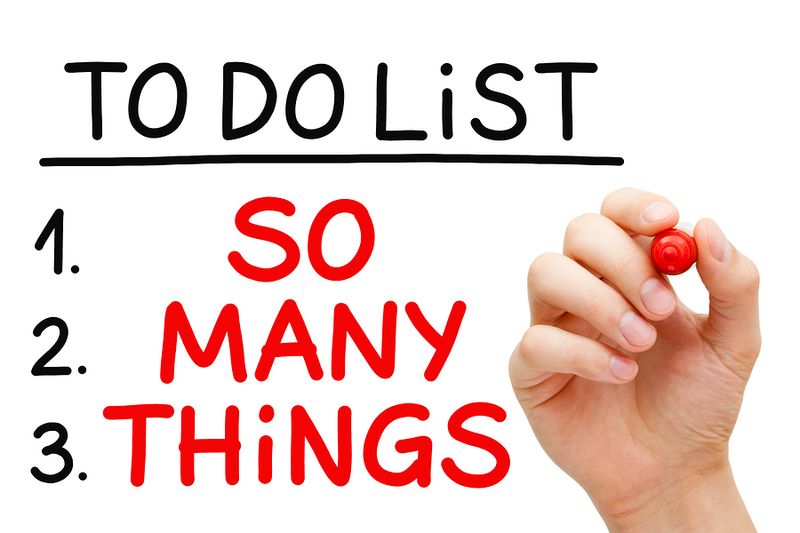5 Tips and Tricks + 1 Fundamental Mindshift
This article is the third in our Mealtime Transformation series. We started a couple months ago with an invitation to tell us how you’d like to see your mealtimes transformed. The answers to that survey were helpful and surprising as we reported last month. Now we want to begin responding to some of the transformational hopes readers shared, beginning with Issue #1: Reducing Mealtime Stress. We hope that with some new perspectives, strategies, tips and skills, 2016 can be the beginning of your meal time transformation.
Where Does Your Mealtime Stress Live? Time, Skills or Both?
I remember hosting many a family dinner over the years, for anywhere from 4 to 24 extended family members. I always envisioned they would be like the wonderful Italian family meals you see in the movies, with everyone relaxed, chatting and enjoying themselves. Instead, our family gatherings were hurried, hassled and highly stressful. You see, the men in my family have diabolical blood sugar issues. If dinner isn’t served by 5:30 p.m., their blood sugar plummets and they become grumpy, sullen monsters, ready to explode at the slightest provocation. This put me under tremendous pressure. As my creative outlet, cooking is something that flows for me, not at all beholden to any rigid schedule. So try as I may, I couldn’t get the meal on the table at exactly 5:30. So tempers and fuses inevitably sparked and exploded.
While this is an extreme case of mealtime stress, I experienced lesser versions of it almost every day when my children were growing up. As athletes, they would arrive home famished and I could never get a meal on the table fast enough for them–and fast enough so there was time after dinner for all the homework, bill-paying, phone calls, dishes and all the other things we want to accomplish after work.
Time Stress These examples came to mind as I started writing this post, because I wanted to examine what meal time stress looks like and where it resides. The assumption, I think, is that cooking itself is the culprit. But upon closer examination, I discovered my stress didn’t have to do with cooking per se. The acts of chopping and mixing and sauteing were actually quite soothing and stress relieving! Instead, I realized, the root of my stress lay in the same place I think most stress lies: Having too much to do in the amount of time available to do it.
Skills Stress While cooking itself was not a stress-inducer for me, it could well be the culprit for others, i.e., you face a critical task day in and day out but don’t have the skills and tools to do it capably and comfortably. That is certainly reasonable cause to feel stressed.
Have you considered the location and dimensions of your mealtime stress? It’s a critical first step before we can begin chipping away at it. Let me know if your root causes are one of the two above or something different. For now, I’ll address just the time and skills deficits.
Take the 2-Minute Mealtime Stress Survey
Skills Deficit
Let’s take the easy one first. If you’re feeling stressed because you don’t have the ability to execute, the answer is simple: Acquire more skills! There is no need for you to feel at a loss in the kitchen. Our online, Cook Happy | Live Healthy mealtime transformation program shares just what you need to start getting healthy meals on the table confidently and comfortably. So go there now and begin building your repertoire of skills, tools, systems and strategies to make cooking entirely manageable.
Time Deficit
 Now for the harder issue: The stress caused by feeling that we don’t have enough time to do what’s demanded of us.
Now for the harder issue: The stress caused by feeling that we don’t have enough time to do what’s demanded of us.
Sadly, when an issue gets assigned to the “lack of time” category it’s the same as tossing it on the pile of unsolvable cases. If you don’t have time, then you don’t have time, right? Common wisdom says there is no ambiguity, no room for exploration, no hidden possibilities when it comes to time. You either have it or you don’t. And if you don’t have time to make meals, then muddling a meal together so you don’t starve is going to be stressful and unpleasant.
In this zero-sum game, you will never come out a winner. But we don’t want to come out losers in the healthy eating game. Surely there are some options?
Over the years, I’ve been treated to a number of experiences that revealed how expansive is the territory between polar opposites like having time and having no time. In our culture, of course, that particular territory is well hidden. The success of our economy depends largely on an unquestioned belief that we exist in a no-time zone and the only way to survive is by purchasing some time-saving gadget or service. So of course we’ve been kept in the dark about the possibilities that actually exist.
But I’ve discovered and want to share some of those possibilities that lie in that territory. First let me share 5 Tips and Tricks that can be implemented quickly and may be enough to relieve your meal time stress. But maybe you need a deeper solution, so I’ll also share 1 Fundamental Mindset Shift.
5 Tips and Tricks to Relieve Mealtime Stress
- Set Firm Expectation Boundaries This goes for you as well as everyone else at the dinner table. Do your best to accommodate everyone’s hunger needs, but clarify what you need in terms of meal making time and what behaviors are acceptable vs. out of bounds. Too often, I put myself in the servant role rather than the more appropriate role of facilitator for the communal activity of getting meals on the table. As for your own stress levels? Enjoy a civilized glass of wine while cooking! This tip comes courtesy of a class member who experienced a complete mealtime transformation with just this single trick!
 Get some help! Closely related to the previous tip, review the story of The Little Red Hen with spouses and children. Make sure they understand the moral of the story: Instead of complaining, help! Sure child labor is illegal–but not in your own house! And surprisingly enough, kids are quite competent, which I learned from teaching kids as young as eight. They were often as or more competent than some adult students! Indeed children and young adults are a busy parent’s greatest un-mined resource. For your part, however, you must invest in a little training time and accept help that may not be up to your quality standards. Know, however, that enabling your kids to feed themselves healthfully is one of the most valuable gifts you can give them.
Get some help! Closely related to the previous tip, review the story of The Little Red Hen with spouses and children. Make sure they understand the moral of the story: Instead of complaining, help! Sure child labor is illegal–but not in your own house! And surprisingly enough, kids are quite competent, which I learned from teaching kids as young as eight. They were often as or more competent than some adult students! Indeed children and young adults are a busy parent’s greatest un-mined resource. For your part, however, you must invest in a little training time and accept help that may not be up to your quality standards. Know, however, that enabling your kids to feed themselves healthfully is one of the most valuable gifts you can give them.- Veggies to the Rescue Help everyone wait for dinner calmly (including you) with bags of pre-cut veggies and maybe a little dip (or a bowl of olives.) Besides keeping high-stress hunger pangs at bay, you increase vegetable intake without ruining appetites for the meal your preparing.
- Mise en Place This French phrase simply means putting everything in its place, i.e., before you start cooking, tick through your recipe a pull out each ingredient and piece of equipment you’ll need; arrange everything for organized and easy access. This can make cooking much less stressful as you don’t get flustered trying to find things in the heat of the moment, something that’s especially trying if your kitchen isn’t well-organized.
- Leftover Magic This is such a no-brainer. Spend 10 minutes more to double a skillet dish, but then you eat for free the next day–timewise, that is. What a way to eliminate the stress of making a meal! Remember this strategy doesn’t always require that you double a dish. You can instead just double some of the ingredients, e.g., roasted butternut squash that can go in a soup the next day, extra mashed potatoes that can top a pot pie the day after that, a big roast that can be crock potted and then shredded for a beef noodle bowl one night and tacos a couple nights later.
Now a lot of articles will stop with a few tips and tricks like the ones above. Sure, that’s what readers love, but all too often, tips and tricks alone may not really solve an issue. In this case, for instance, what if you:
- don’t know what you’re making so you can’t really get help from spouse and/or kids?
- haven’t got a meal idea or recipe in mind so you could do your mise en place?
- have no veggie bags in the frig to rush out–or even some carrots to just wash and set out
- forgot to buy potatoes at the store so you have something to double for leftovers?
- wouldn’t know what to make with a butternut squash on Day 1, much less Day 2?
- don’t have a crock pot and wouldn’t know how to cook a roast in it?
- or you can’t even have a glass of wine because you neglected to get it on your shopping list?
If you are facing these kinds of roadblocks, then the five tips above aren’t going to solve your stress problems. To really address your meal time stress, we need to dig deeper and look at what’s going on in your thoughts. Is your head behind your stress-reducing hopes and intentions?
1 Mindset Shift for a Deeper Response: The Proactive Approach
I know I have framed the stress issue as a “lack of time” problem, but very often we confuse time availability with time effectiveness. So let’s explore the possibility that mealtime stress is at least partly a “how we use our time” problem. We all spend some time getting meals, whether it’s heating up a pizza in the microwave or going out to eat, rustling up a little pasta or stopping by the deli. So it’s not the case that we have no time to make meals. More often than not, stress arise because we don’t know how to use the time we have in a way that’s efficient and leads to the results we want: healthy, yummy, satisfying meals.
There are lots of ways to make our time in the kitchen more effective. The Cook Happy | Live Healthy program, shares not only healthy cooking skills to relieve mealtime stress, but also cooking time management skills that are extremely effective at relieving stress, things like planning your meals, shopping with a list, organizing your kitchen spaces, and so on.
Most of us know about these time management skills and apply similar sorts of skills to complete projects at work, plan a vacation, redecorate a room, throw a party and so on. But we frequently overlook them when it comes to making good meals. The reason, I’ve discovered, is that we’re often missing the fundamental mindset to justify, rationalize, inspire and propel us to take control of and be efficient with meal making.
A proactive–rather than reactive–approach to meal times is the key mindset that determines whether we are able to use our cooking time most effectively and reduce the stress that turns meal times into misery. Look at the difference:
Attitude
- Proactive: Get on top of things, get after them, take the bull by the horns
- Reactive: Put off dealing with mealtimes, ignore the reality of 5:30 hunger, hope the whole mealtime thing magically resolves itself and goes away
Actions
- Proactive: Figure out in what to make in advance, get the right things at the store, come home and hit the deck running
- Reactive: Come home, open the frig and do “The Refrigerator Stare,” irrationally believing that if you just stare long enough the random condiments and rotting veggies in your frig will magically materialize into a healthy meal
Results
- Proactive: Efficiently dispense with getting a meal on the table that meets your eating ideals; utilize stress-reducing tips as needed because you’re equipped to do so.
- Reactive: Experience lots of stress trying to figure out at the last minute what to throw together for a meal; just try to make it through another night; end up dialing for takeout, spending an hour going out to eat at a crowded restaurant, or eating “whatever:” cheese and crackers, a quesadilla, maybe a bowl of pasta, definitely not any veggies and not the kind of healthy meal you want to start eating
So when we talk about alternatives to the no-time dead end, can I encourage an exploration of your meal making mindset. When you race in the kitchen at 5:30 or 6:00 or 7:00, are you prepared to make a meal? Did you think about it the day or night before? Or did planning for your meals sound stupid, old-fashioned or just not the way you want to spend your time? How often are you stuck doing the Refrigerator Stare?
If you feel stressed, stop long enough to take note: Is it because you’re wasting precious minutes spinning your wheels to get out of a mealtime mud hole–trying to come up with something to make, working around missing ingredients, feeling bummed that you won’t make progress on your healthy eating goals, and really feeling bummed that you’ll end up with a meal that doesn’t taste that good.
Can you see how, by having a proactive mindset, you’re positioned to do what it takes to relieve the stress from mealtimes? You’re not fighting a mindset that really just wants to ignore mealtime and wishes it would just disappear. Instead, your mindset actually propels you to figure out what to make in advance of the mealtime rush hour, when your brain has some space to function properly and you are left with time to drop by the store for whatever is needed. And as you begin thinking ahead, then you’ll find the 5 Tips and Tricks become accessible:
- Do your mise en place–you know what you’re making and have likely pulled any recipes you need so you know what ingredients and tools to assemble
- Delegate away–with a mealtime game plan to guide you, it’s easy to see where outside help can be used to lighten your load
- Got veggies? You bet. They’re a standing order so you’re sure to have them on hand because you shopped in advance
- Leftovers? Easy. When you planned your meal, you figured out a way to get double either the entire dish or some component–and you bought extra at the store–so now you can have a time- and stress-saving meal the next day.
You can see that being proactive opens a raft of possibilities to use your time smoothly and efficiently so meal making becomes unstressed and easeful
 Another Story
Another Story
My son is a very dear and wonderful son, but he was born with a genetic aversion to housecleaning. So as a youngster, when the time came for family cleanup, he would whine, complain, sulk and hide in a closet rather than do the few simple things he was assigned. Try as I might, I couldn’t convince him that he had grossly miscalculated the tradeoffs. Four hours of sulking was certainly not a sensible tradeoff for 30 minutes of easy housecleaning.
While the error of his young mind’s thinking is obvious, a reactive approach to mealtimes may be harder to spot, as it has been so thoroughly ingrained in our meal making culture by companies who make convenience and fast foods. It takes a concerted, conscious effort to see if there might be an error in your fundamental approach to meal making. But I hope you’ll put out that effort and begin shifting to the far more productive, proactive mindset. Give it a try, explore the possibilities it opens up, and see if it doesn’t help extract you from being stuck in a stressful, no-time dead end.
Vision for the Future
You know that whole negative thought thing: focus on what you don’t want and you’ll just get more of it. So before leaving the subject of stress, why not go one step further and replace unfruitful thoughts about stress with fruitful thoughts of what you’d like mealtimes to look and feel like: Do you dream of having big happy Italian-style meals where everyone is chatting and laughing while enjoying their meals? Or instead of stress, would you love a solid sense of confidence around meal making? Would you be happy if your meals made you happy because they taste so good? Would you like to feel more relaxed and enjoy cooking a little more?
For me, my old stress has been replaced with my love for the creative space that’s opened by having a colorful palette of vegetables, grains and proteins to “paint” a meal with. Meal making is my end of the day wind-down time when I escape the computer for something tactile, real–and delicious!
What about you? Have a vision? Or other suggestions about dealing with mealtime stress? Share in the comments in this post or in our mini-survey:
Take the 2-Minute Mealtime Stress Survey
Now are you ready for skills? Be sure to check out Cook Happy | Live Healthy, the meal making transformation program. Unique to this program, you get not only a solid foundation of tasty cooking skills, but you’ll also get the proactive skills needed to be prepared to cook. Did you know that you need skills to be prepared to cook? Most people don’t, but they are fully 60% of the meal time success equation. So if you don’t have them, there’s a good chance you will feel stressed instead of capable at mealtimes.
